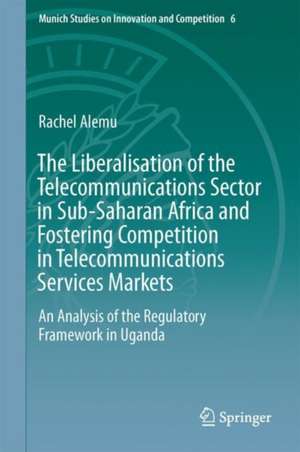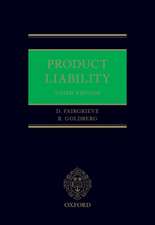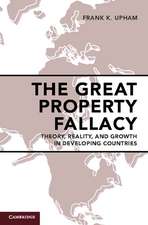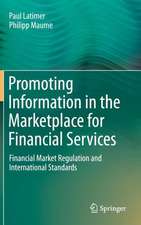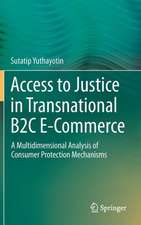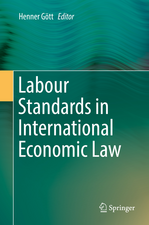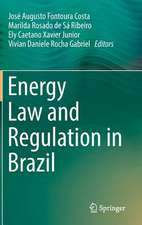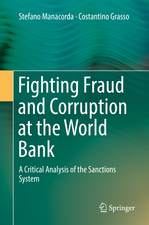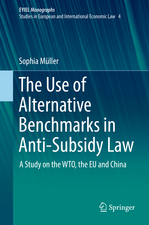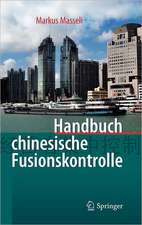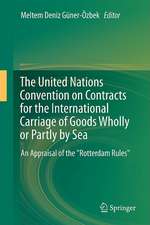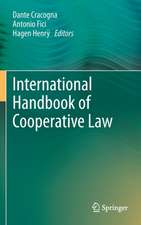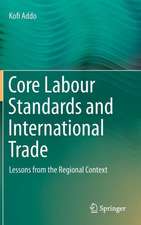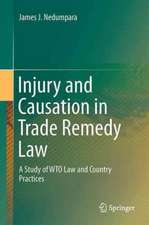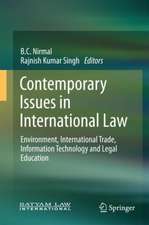The Liberalisation of the Telecommunications Sector in Sub-Saharan Africa and Fostering Competition in Telecommunications Services Markets: An Analysis of the Regulatory Framework in Uganda: Munich Studies on Innovation and Competition, cartea 6
Autor Rachel Alemuen Limba Engleză Hardback – 9 feb 2018
| Toate formatele și edițiile | Preț | Express |
|---|---|---|
| Paperback (1) | 646.11 lei 6-8 săpt. | |
| Springer Berlin, Heidelberg – 4 iun 2019 | 646.11 lei 6-8 săpt. | |
| Hardback (1) | 652.49 lei 6-8 săpt. | |
| Springer Berlin, Heidelberg – 9 feb 2018 | 652.49 lei 6-8 săpt. |
Din seria Munich Studies on Innovation and Competition
- 15%
 Preț: 644.63 lei
Preț: 644.63 lei - 15%
 Preț: 587.20 lei
Preț: 587.20 lei - 15%
 Preț: 528.30 lei
Preț: 528.30 lei - 18%
 Preț: 952.09 lei
Preț: 952.09 lei - 15%
 Preț: 654.43 lei
Preț: 654.43 lei - 18%
 Preț: 724.63 lei
Preț: 724.63 lei - 18%
 Preț: 1007.49 lei
Preț: 1007.49 lei - 18%
 Preț: 782.24 lei
Preț: 782.24 lei - 18%
 Preț: 894.65 lei
Preț: 894.65 lei - 18%
 Preț: 786.04 lei
Preț: 786.04 lei - 24%
 Preț: 828.05 lei
Preț: 828.05 lei - 15%
 Preț: 652.64 lei
Preț: 652.64 lei -
 Preț: 430.97 lei
Preț: 430.97 lei - 15%
 Preț: 655.78 lei
Preț: 655.78 lei - 15%
 Preț: 645.47 lei
Preț: 645.47 lei - 20%
 Preț: 576.88 lei
Preț: 576.88 lei - 18%
 Preț: 729.23 lei
Preț: 729.23 lei - 18%
 Preț: 962.18 lei
Preț: 962.18 lei - 18%
 Preț: 794.39 lei
Preț: 794.39 lei
Preț: 652.49 lei
Preț vechi: 767.63 lei
-15% Nou
Puncte Express: 979
Preț estimativ în valută:
124.87€ • 129.88$ • 103.09£
124.87€ • 129.88$ • 103.09£
Carte tipărită la comandă
Livrare economică 14-28 aprilie
Preluare comenzi: 021 569.72.76
Specificații
ISBN-13: 9783662553176
ISBN-10: 3662553171
Pagini: 389
Ilustrații: XXI, 389 p. 13 illus. in color.
Dimensiuni: 155 x 235 mm
Greutate: 0.75 kg
Ediția:1st ed. 2018
Editura: Springer Berlin, Heidelberg
Colecția Springer
Seria Munich Studies on Innovation and Competition
Locul publicării:Berlin, Heidelberg, Germany
ISBN-10: 3662553171
Pagini: 389
Ilustrații: XXI, 389 p. 13 illus. in color.
Dimensiuni: 155 x 235 mm
Greutate: 0.75 kg
Ediția:1st ed. 2018
Editura: Springer Berlin, Heidelberg
Colecția Springer
Seria Munich Studies on Innovation and Competition
Locul publicării:Berlin, Heidelberg, Germany
Cuprins
Introduction.- Competition and Regulation of the Telecommunications Sector.- Liberalisation of the Telecommunications Sector: From Public Monopoly to Competitive Telecommunications Markets.- Regulating Anti-Competitive Conduct in the Telecommunications Market in Uganda.- Foreign Direct Investment in Telecommunications Sector and Regulation of Anti-Competitive Behaviour: The Specific Case of Cross-Border Mergers.- Regulation of Network Interconnection and Network Access.- Efficient Radio Spectrum Regulation: Facilitating Competition in the Wireless Communications Markets in the Telecommunications Sector.- Competition Regulation in the Telecommunications Sector in Uganda: The Potential Role of a National Competition Law.- Final Conclusions.
Textul de pe ultima copertă
This study investigates whether the existing regulatory framework governing the telecommunications sector in countries in Sub-Saharan Africa effectively deals with emerging competition-related concerns in the liberalised sector. Using Uganda as a case study, it analyses the relevant provisions of the law governing competition in the telecommunications sector, and presents three key findings: Firstly, while there is comprehensive legislation on interconnection and spectrum management, inefficient enforcement of the legislation has perpetuated concerns surrounding spectrum scarcity and interconnection. Secondly, the legislative framework governing anti-competitive behaviour, though in line with the established principles of competition law, is not sufficient. Specifically, the framework is not equipped to govern the conduct of multinational telecommunications groups that have a strong presence in the telecommunications sector. Major factors hampering efficient competition regulation include Uganda’s sole reliance on sector-specific competition rules, restricted available remedies, and a regulator with limited experience of enforcing competition legislation. The weaknesses in the framework strongly suggest the need to adopt an economy-wide competition law. Lastly, wireless technology is the main means through which the population in Uganda accesses telecommunications services. Greater emphasis should be placed on regulating conduct in the wireless communications markets.
Caracteristici
Offers insights into the telecommunications market in Sub-Saharan Africa Explains the miraculous transformation of the telecommunications sector in the region despite the overall lag in uptake of technology in other sectors Provides an in-depth analysis of the key regulatory aspects critical for fostering sustainable competition in the telecommunications sector
